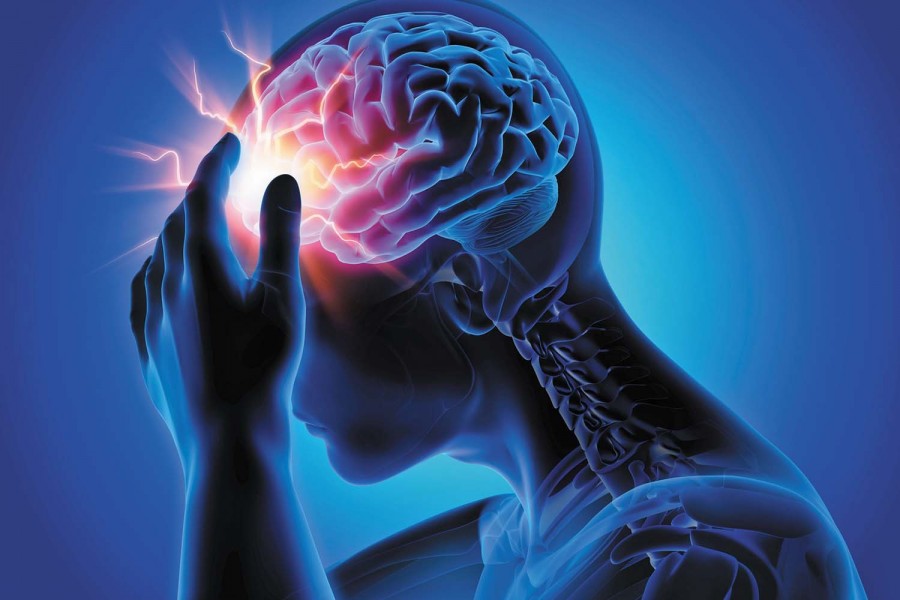
Published :
Updated :

Headache is not a big issue to be worried about, but migraine is. Why? Because migraine is considered to be a disabling neurological condition that significantly impacts the quality of our lives.
Migraine is actually one of the common headaches. Worldwide, it is estimated to affect 12 per cent of the population. Migraine is most common in the third decade of life and more prevalent in women than in men.
In Bangladesh, there is a lack of large-scale data. A cross-sectional study among the students of Jahangirnagar University and Rajshahi University identified migraine in 21 per cent of the participants, with a larger percentage being female.
Migraine is a very painful headache. Usually, the pain starts on one side of the head, and then it may spread around the eyes or even behind the cheeks.
The pain feels like a throbbing, pulsating, or pounding sensation. Sometimes it is associated with nausea or vomiting. Often the pain is exacerbated by light, sound, or even a particular smell. The worst part is, it may last several days.
When migraine attacks, it is important to follow the physician’s advice and take the medication. Additionally, there are some simple things we can do to alleviate the pain.
First and foremost, as soon as the pain starts it is important to find a place away from light and noise. That is because many migraine patients are sensitive to light and sound.
Applying warm or cold compress across the forehead or the back of the neck has also been found to be helpful.
Dr Lawrence C. Newman, director of the division of headache at NYU Langone Medical Center in New York City and a board member of the American Migraine Foundation said that many of his patients prefer a cold compress.
He suggested keeping a cloth between the ice pack and the skin while applying it. He also acknowledged that some people may find a warm compress or a warm shower more comforting. Ultimately, the patient will know which one is more beneficial.
Doctors also advise migraine patients to drink plenty of water. American Migraine Foundation explains that staying hydrated between attacks may help to prevent a recurrence.
It is also suggested to take a small amount of caffeinated beverage since it has been shown that caffeine can reduce the pain to some extent or enhance the effects of medications like acetaminophen or salicylic acid.
During the headache, gentle massaging of the forehead and the neck can relax the muscles and decrease the pain.
But some people may be extremely sensitive to touch during the attack. For them massaging is not an option.
In the case of exercise, it is not a good idea to do it during the attacks as exercise could make it worse. But in between attacks, if properly done, exercise can reduce the frequency of migraine.
Professor Dale Bond of the Miriam Hospital and Brown Alpert Medical School in Providence, Rhode Island refuted the belief that exercise can be a trigger migraine.
He argued that it is more of a myth. According to him exercises like brisk walking, swimming, running, or cycling can reduce the number of attacks. The only caveat is they should be avoided during an actual attack.
There are a few other things to prevent repeated migraine attacks. Maintaining sleep hygiene and a regular sleep calendar is crucial. Eating wisely, with meals same time every day and no missed meals, avoiding foods that are known to trigger migraine in a particular individual, etc., help. Trying to keep stress level to a minimum is also something we should try.
Last but not the least, all patients with migraine should keep a diary. It will be a record of the attacks with notes on severity, symptoms, any associated factors, and anything the patient feels important.
This diary is actually an important diagnostic and management tool for the physician. So if there is a migraine patient reading this article, please maintain a diary and take it to the physician the next time you go.
Imtiaz Ahmed completed his MBBS from Dhaka Medical College
imtiazdmc@gmail.com


 For all latest news, follow The Financial Express Google News channel.
For all latest news, follow The Financial Express Google News channel.